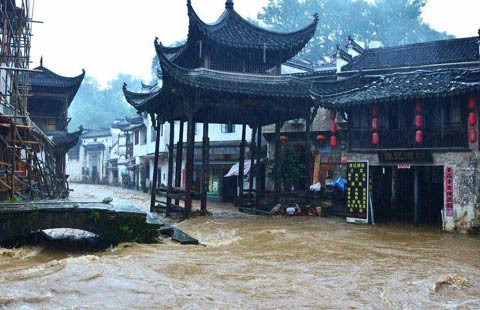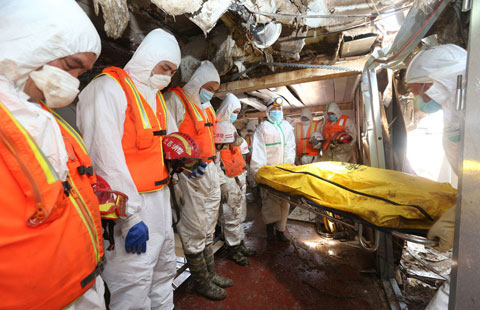G7's veiled criticism deviates from truth
Updated: 2015-06-10 07:46
(China Daily)
|
||||||||
 |
|
Leaders from the Group of Seven (G7) industrial nations hold a working dinner in the Bavarian village of Kruen, Germany June 7, 2015. [Photo/Agencies] |
The statement issued by leaders of the G7 industrialized countries at the end of their two-day summit on Monday contains a thinly veiled criticism of China over the East and South China seas. Western interference of such magnitude cannot possibly help resolve the issues peacefully, but only further complicate them.
The leaders of Britain, Canada, France, Germany, Italy, Japan, and the United States, said they were concerned about tensions in the East and South China seas and called for countries to abide by international law.
"We strongly oppose the use of intimidation, coercion or force, as well as any unilateral actions that seek to change the status quo, such as large-scale land reclamation," said the communiqué.
Though the G7 leaders have cloaked their language by avoiding mentioning China, it is obvious that they intend to exert pressure on China over its island building in the South China Sea. The wording of the statement pretty much resembles that used by US officials lashing out at China over the maritime disputes.
In fact, no member state of the G7 group is a party to the South China Sea disputes, and their unified fingerpointing is based on neither truth nor reason.
There is no need for China to adopt "any unilateral actions" to "change the status quo" of the South China Sea isles because China has an irrefutable historical and legal basis for upholding its sovereignty over the maritime territory.
It was the Philippines and Vietnam that changed the "status quo" of the waters when they illegally seized Chinese isles in the South China Sea some time ago and built a number of facilities, including military ones, on them.
Hence, the G7's accusations in relation to China, as groundless and futile as they are, will only ratchet up tensions over the disputes.
It is also noteworthy that the group has allowed the hardline attitudes of Washington and Tokyo on China's island reclamation issue to play an upper hand in its collective stance over the issue. Japanese Prime Minister Shinzo Abe vociferously raised the South China Sea issue at the G7 summit.
Considering that the summit has mainly focused on the Ukraine crisis, climate change and anti-terrorism, discussion of the South China Sea issue is a deviation from the main agenda, which will further weaken the group's integrity in the world arena.

 Yes, we are waiting for our children
Yes, we are waiting for our children
 Chinese artist to be recognized at International Muse Awards
Chinese artist to be recognized at International Muse Awards
 2015 Apple WWDC kicks off in San Francisco
2015 Apple WWDC kicks off in San Francisco
 Ten photos you don't wanna miss - June 9
Ten photos you don't wanna miss - June 9
 National college entrance exam ends in most parts of China
National college entrance exam ends in most parts of China
 Peking University opens Chinese traditional art courses
Peking University opens Chinese traditional art courses
 Rescuers mourn victims on seventh day since Eastern Star disaster
Rescuers mourn victims on seventh day since Eastern Star disaster
 Rescuers enter Eastern Star hull in search efforts
Rescuers enter Eastern Star hull in search efforts
Most Viewed
Editor's Picks

|

|

|

|

|

|
Today's Top News
Prove hacking: experts
Amid tensions, top Chinese brass visiting US
Apple reveals plan to develop all-platform eco-system empire
Video of officer who drew gun on black teens raises tension
Suu Kyi visit to boost ties with Myanmar
China gives its yuan to Broadway
Questions remain unresolved in the cruise ship disaster
Escaped New York prisoners may have had help from staff
US Weekly

|

|






